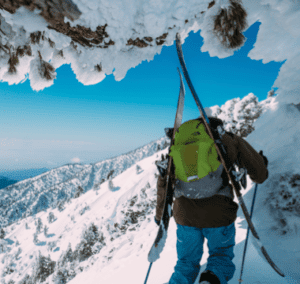Condensed and Edited Article in Conde Nast
by Cassie Shortsleeve
February 11, 2017
 Ski resorts are now providing services to help prevent—or, at least, ease—altitude sickness. We tried them out.
Ski resorts are now providing services to help prevent—or, at least, ease—altitude sickness. We tried them out.
Sitting in the lobby of One Ski Hill Place, a luxury lodge in Breckenridge, Colorado, with a plastic tube in each nostril, breathing through an oxygen tank, I feel silly. I keep breathing in cool, concentrated air.
In recent years, “oxygen bars” like this one—places where you sit down, pay a fee, and get hooked up to an O2 machine to breathe in oxygen-rich air—have popped up in mountain towns across the world. The promise: A 15- or 20-minute dose of O2 can help alleviate mild symptoms of acute altitude sickness—fatigue, shortness of breath, headache, and nausea—that many people suffer from in mountain environments.
In destinations like Aspen (which sits at about 7,900 feet in elevation) or Breck (at 9,600 feet), it’s an attractive idea for alpine newbies, wellness travelers, and those fearing altitude sickness, like myself: a sea-level girl who’s still easily affected by a once- or twice-a-year trip to the mountains.
“About 40 percent of travelers who visit Aspen get altitude sickness,” says Irisha Steele, spa director at the Rèmede Spa at St. Regis Aspen Resort . The hotel’s own oxygen bar, which hooks guests up to a cannula for $50 for a little air, has been wildly popular: “We had 10,000 guests use the oxygen room last year… and that’s not including people doing spa services.”
So, after a morning spent inching along on chairlifts en-route to almost 13,000 feet, here I am with the tubes in my nose, hoping for the best. To be honest, the cool air is a welcome break from skiing. And after a few minutes spent breathing, I even feel an energized kind of calm; more ready to take on an afternoon session on a black run.
Inanna Hall, owner of Breckenridge’s Harmony Health & Massage, which offers the service, says my feelings are common. Extra oxygen, she says, can “help people feel more restful, less nauseous, like they can take a deeper breath, and it can make them feel more at ease.”
But doctors warn such touted benefits are short-lived. “When you breathe in extra oxygen, it has a benefit only for the time you’re using it,” explains Peter Lemis, a physician with Summit Cardiology in Frisco, Colorado who frequently sees patients with altitude sickness. That means that initially you may feel a little less out of breath, and your headache could dissipate; but a small dose of O2 won’t help you in the long-term. (And if you’re truly suffering from more serious acute altitude sickness, your best best bet is to seek lower altitude—not an oxygen bar.)
So as for my post-oxygen bliss? Dr. Lemis suggests some psychological factors (a placebo effect, perhaps) might be at play. Travelers like myself, who are adjusting to new heights, could also notice the short-term benefits more. But from a medical standpoint, Lemis makes another important point—one that some innovators are out to address: Since the benefits wear off so quickly, oxygen bars don’t help during the times we need O2 at high altitudes the most, which is when we’re sleeping.
“When we’re awake, most of us without even realizing it breathe faster and deeper to make up for low oxygen,” he says. “But when we’re asleep, we breathe like we’re at sea level, which is not adequate at altitude, so oxygen levels fall.”
One Colorado-based company, Altitude Control Technologies, is engineering mountain manses in towns like Aspen, Telluride, and Vail to feature rooms that can be transformed to a sea level-like atmosphere in a matter of hours.
